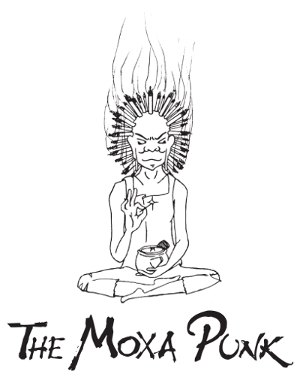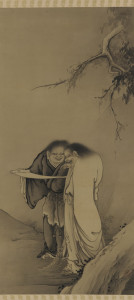black lentils
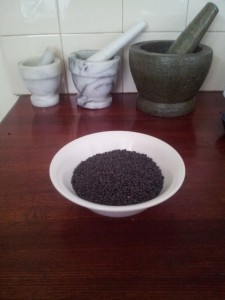
Black lentils. I just had to mention to the shop assistant that because they were black they would nourish the Kidney system. She asked if I knew about red beans. “Aduki beans”, I said. “Yes,” she replied, “They treat the liver”. I’ve learned not to directly contradict friendly people who are onside with Chinese Medicine, so I merely mentioned that aduki beans clear toxic heat from the system. But rather than treating the liver, aduki beans or chi xiao dou treat the Heart and Small Intestine systems – because they are red.
But back to the black lentils. I cook them in bone broth, mainly because it makes them delicious, but it doesn’t hurt that it compounds its nourishment of the Kidney system. This helps with bone health, lower back and knee strength, endurance, sexual, reproductive, and urinary function, and the kind of will that shows as a commitment to seeing things through.
They won’t want to eat the lentils, but the Paleo diet disciples are big on the bone broth. Buy your marrow bones from your local butcher before he finds out that some people are willing to pay good money for them.
winter
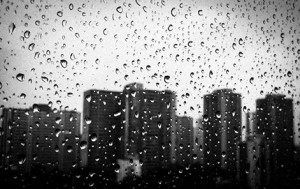
The three months of winter,
they denote securing and storing.
The water is frozen and the earth breaks open.
Do not disturb the yang [qi].
Go to rest early and rise late.
you must wait for the sun to shine.
Let the mind enter a state as if hidden,
as if shut in
as if you had secret intentions;
as if you already had made gains.
Avoid cold and seek warmth and
do not [allow sweat] to flow away through the skin.
This would cause the qi to be carried away quickly.
This is correspondence with the qi of winter and
it is the Way of nourishing storage.
Opposing it harms the kidneys.
In spring this causes limpness with receding [qi],
there is little to support generation.
– Huang di Nei Jing Su Wen trans. Paul Unschuald
South Asian paintings of winter usually show snow. This photograph of winter rain in Toronto is more appropriate for the southern Australian winter.
Chinese literature discusses cold, dry winters. Melbourne’s winter months are the coldest of the year, but are relatively mild and quite wet, with extended rain periods.
Despite this difference with the cosmic flow of yin and yang in the Middle Kingdom, Chinese Medicine can still guide us on how to stay healthy in winter.
As the Su Wen outlines above, we should stay indoors and avoid the cold. Most of us will welcome the advice that we shouldn’t get out of bed until the sun comes up. Winter is a time to reserve and store and some have interpreted the rather cryptic third stanza above as applying this to sexual activity, but the ninth century commentator and editor Wang Bing commented ‘All this to say one does not wish to go out needlessly lest one is struck by cold’ (Unschuld p. 49). Those that like to snuggle up with a good friend in winter would prefer this interpretation.
We should avoid exercising outdoors after dusk. Young people with exuberant yang may get away with evening footy training and the like, but they should avoid wearing cold, sweaty clothing when they are not active, and should take a hot shower or bath as soon after training as they can.
Winter is the time to eat warming, flavoursome foods and to nourish the shen organ-meridian system linked to the kidneys. Wong’s ‘Four Seasons’ suggests: anchovies, bay leafs, capers, chestnuts, chicken, coriander, dill, fennel, leek, mussels, mutton, nutmeg, pine nuts, rosemary, spring onions, prawns, sweet potatoes, and walnuts. Trout and salmon are warm-natured fish. Eat stews, soups and curries, particularly of flavoursome foods with plentiful qi such as mutton or brisket. Stocks and soups from long simmering of bones are great. As well as eating warming foods we should moderate our consumption of cooling foods. Winter is not the best time to eat a lot of raw foods, salads, sushi or icecream, tofu should be cooked or even fried.
Winter is also time when it’s thought to be healthy to enjoy a little alcohol. Chinese will drink rice wine that has had warming herbs steeped in it, but regular wine is warm enough to help us through winter. Wong says that it ‘enlivens the spleen, warms the digestive system, expels wind and cold, promotes circulation of the qi and blood, improves appetite and dispels fatigue.’ But alcohol would kindle any fire in the body, and red wine seems particularly unhelpful to people who overheat at night. The alcohol in beer is warming, but beer can bring dampness. Dark beers warm the yang more than light ones, and some beers are brewed with orange peel, cardomon, and other spices that can warm the digestive system and reduce dampness.
At the first signs of having caught a cold simmer two slices of ginger with three spring onion stalks for twenty minutes and drink the broth.
A warming nourishing dish from Wong that doesn’t use meat:
stir-fried daikon radish with carrot:
Stir-fry finely diced daikon radish with carrot until al dente and slightly browned. Add a handful of chopped shallots and cook for another minute. Add soy sauce and black pepper to taste.
Wong says that the carrot supports digestion and the radish clears damp that hinders digestion.
ribs
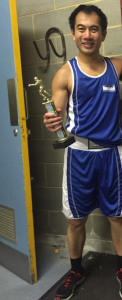
I’ve been treating a few rib injuries lately. Wayne copped one in the ribs sparring. He treated it himself with herbal plaster and Yunnan Bai Yao for a few days, then started taking the herbs I prescribed for him. After six days he was pain free. A week later he was in the ring and, hopefully, not dropping his guard too much for being worried about body shots.
Treatment was based on a Shaolin remedy for rib injuries from a punch:
cu ru xiang, cu mo yao, dang gui, cu zi ran tong, hong hua, chi shao, su mu, yu jin, xue jie, gan cao.
The original instructions for this remedy required adding infant’s urine to the mix, I didn’t have any on hand so I added more medicinals to course qi, remove blood stasis, and repair tendons and bones. The medicine was a very ‘funky’ brew, perhaps the urine would have made it taste better.
Arthur had a BJJ training partner fall into his ribs with his knees. His injury was probably worse than Wayne’s and took longer to heal. At first I got him to use san huang san on his ribs and to take a similar herbal prescription to Wayne’s. Later I added du zhong to improve the formula’s action of strengthening tendons and bones. This is du zhong, the bark of Eucommia trees, it even looks like ribs with sinewy tissue between them.
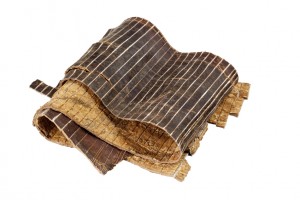
Blows to the ribs may fracture the bone, tear or strain the rib cartilage, strain or tear the intercostal muscles. GP’s could get X-rays taken to find out if the bone is fractured, but it makes no difference to treatment as there is nothing they could do to help the injury heal anyway. My first rib injury came from someone driving into them when I was on the side of a maul playing rugby. My GP second-row partner told me that aspirin was the best pain killer for rib injuries, and that he had some local in the car when we played the following week just in case the excitement of playing wasn’t enough to dull the pain. Since then I’ve re-injured them boxing, falling off a bicycle riding down a sand-dune track at Rottnest in the dark, and practising judo. One judo competition I sprung them twisting and lifting to get someone off me in ground work and couldn’t complete the competition. Unfortunately I had always used ice straight after the injuries, and didn’t know how Chinese Medicine could help the injuries repair so that they wouldn’t recur.
cold mountain poems
Sat on the cliff today,
sat so long the mist burned off.
Like a road the stream was, clear at its mouth,
a long time searching from a green crag top.
White clouds cast clear shadows in the silence,
light of the moon still floats, lingering.
No dust, no dirt on me,
How could this heart hold grief?
I re-read Kerouac’s Dharma Bums recently, and didn’t enjoy it anywhere near as much as I did when I was in my 20’s. But I wondered about the Japhy Ryder character and through the magic of the intermcweb learned about Gary Snyder. Beloved by the Beats, who were a bit urban and cissy, for his backcountry real man ways he also taught them about Zen. After stints as a Zen monk, and dropping out into deep ecology primitivism he ended up with a cosy middle-class life as a university professor.
Anyway, he was a poet and one of his first publications was a translation of the Cold Mountain Poems by the mythical Han Shan. I wanted to read his translation but found someone else’s first and read that. Han Shan and his sidekick Shih-te were the original hobo poets. They dropped out, lived in the mountains, and graffitied poems on rocks and walls. The poems are about being with nature and away from the entanglements of corrupted life.
The point. This is the Daoist ideal of harmonious existence with the pure world, and while there are Buddhist, Confucian, and even Communist elements to Chinese Medicine its core is this ideal existence as the paradigm of healthy life. But it’s cold in those mountains and hifi won’t work so the Moxa Punk isn’t going to tell you to abandon your modern life to be healthy. Even Gary Snyder ended up in cardigans and hush puppies.
Small steps, little changes, harmonious treatment. Dao for now. Pow.
Just found some translation by Gary Snyder, here.
Scroll down the page for fun. There’s also translation by D.T. Suzuki and Arthur Waley, who was the first to translate Tale of Genji, and Journey to the West – the Monkey King legend – into English.
